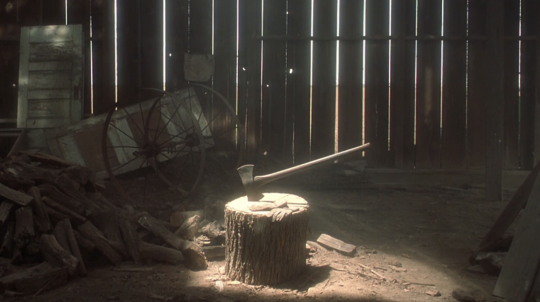Left Hand, Right Hand: Good and Evil in Bill Paxtons Frailtyby April Wolfe
By Yasmina Tawil
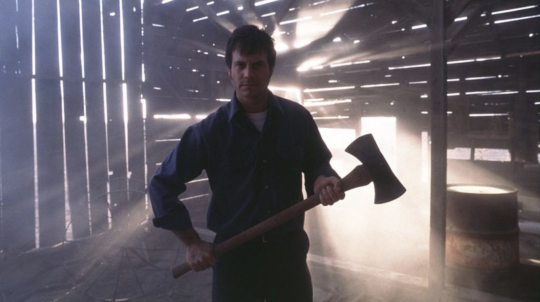
[Last year, Musings paid homage to Produced and Abandoned: The Best Films You’ve Never Seen, a review anthology from the National Society of Film Critics that championed studio orphans from the ‘70s and ‘80s. In the days before the Internet, young cinephiles like myself relied on reference books and anthologies to lead us to films we might not have discovered otherwise. Released in 1990, Produced and Abandoned was a foundational piece of work, introducing me to such wonders as Cutter’s Way, Lost in America, High Tide, Choose Me, Housekeeping, and Fat City. (You can find the full list of entries here.) Our first round of Produced and Abandoned essays included Angelica Jade Bastién on By the Sea, Mike D’Angelo on The Counselor, Judy Berman on Velvet Goldmine, and Keith Phipps on O.C. and Stiggs. Over the next four weeks, Musings will continue with another round of essays about tarnished gems, in the hope they’ll get a second look. Or, more likely, a first. —Scott Tobias, editor.]
When actor Charles Laughton’s now-classic directorial debut The Night of the Hunter premiered in 1955, it’d been a long road to the theater. The film had been in the can for a while, but the studio balked at its premise and execution: Was it a romantic drama or a horror film? A children’s fairy tale or adult entertainment? Marketing materials from the time suggest they never quite figured it out. The studio tried to bury it, but Laughton desperately wanted to go in a different route, traveling the country with his movie to build word of mouth the same way he worked in theater. Anyway, the film was largely forgotten or ignored until its “rediscovery” in the 1970s, when it was hailed a work of great genius. But that didn’t help Laughton, who passed in 1962 and never directed another film.
This brings me to the late Bill Paxton. He’d always considered himself a filmmaker, never an actor, though he’d appeared in some of the most successful films in American history, including Aliens, Apollo 13, The Terminator, True Lies, Tombstone, and so many others. He moved from Texas to Los Angeles at the age of 18, applied to two film schools, and got rejected from both. Acting, to Paxton, wasn’t a career path but a last resort to working in the movie business. Finally, eventually, he was able to direct his first film, Frailty, a dramatic thriller starring Paxton himself and Matthew McConaughey, about a man who believes he was told by God to kill demons disguised as humans, and the two sons who wonder if their father is going insane.
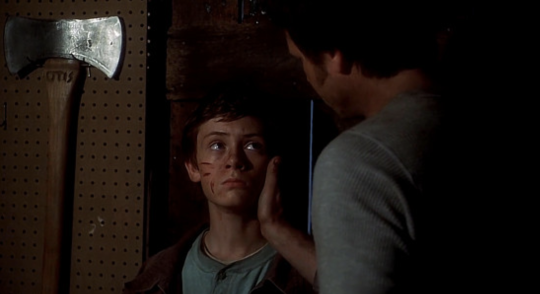
The film’s release was scheduled for September 2001. Then, of course, it wasn’t such a fun time to see misguided men murdering for their beliefs. The film was pushed to April of 2002 but was buried just as deeply as Laughton’s was, with relatively positive but not stellar reviews. This film, too, could not find a home. Not violent enough to be a full-on horror film, too suggestive for families, and both critical and embracing of religion, Frailty seemed to be a movie of too many paradoxes. Even now, it’s difficult to describe this film, which could either be about a serial killer or a savior, depending on how you look at it. Of course, Paxton, who played the touched-by-God father Meiks, felt it was clear that his character was an “Old Testament hero,” though even that qualifier does not answer the question of whether or not Meiks was “good.”
It’s worth noting that Paxton and Laughton lived parallel lives of sorts. Both were character actors, oscillating between the evil or fatherly and somehow exceeding equally at both, which may speak to the actors’ religious backgrounds and subsequent rebellions against them—a performer who can sense the struggle between good and evil in their characters is a successful performer.
Both men had mothers who were devout Roman Catholics and fathers who were ambivalent to the Bible. Laughton, as evidenced in his film, felt a certain amount of antipathy for the church—he was in the closet for most of his life—yet was still soaking in its parables and finding some value there. Paxton as an adult adopted an attitude somewhere between his Catholic mother’s and Pagan father’s, a dash of the genuine and the cynic. And just like Laughton’s film, Frailty is steeped in Christian lore. (Laughton also almost played the lead role of the Preacher in his own film, before his producer talked him out of it.) Both actors, it seemed, had something they desperately wanted to say about faith and could only do it as directors. But aside from these parallel lives and desires, there’s a more direct correlation between the two films.
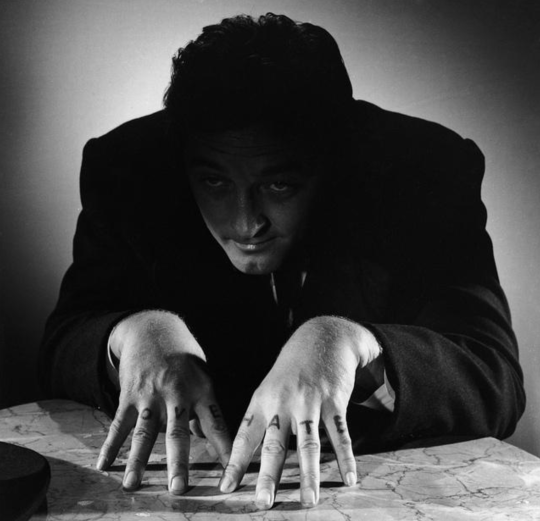
When Paxton got the script for Frailty from fellow Texan Brent Hanley, he was immediately impressed by the writer’s “neoclassical background.” This was a moral tale, and Paxton saw the script reflected the literary “architecture” of the great Southern novels, like To Kill a Mockingbird, only mixed with contemporary Stephen King. He wanted to make Frailty “in a classical way, where you imply and create the horror in the mind’s eye, and show real restraint.” The first film he cited that convinced the producers he was the right one to direct the script was The Night of the Hunter.
Frailty does not possess the painstaking, revolutionary cinematography or German Expressionist theatrical qualities of Night, but cinematographer Bill Butler (who lensed Jaws, Demon Seed, and Child’s Play, among others) brings a style that melds high-contrast pulp with grim seriousness. There are times when Paxton explicitly calls to mind Night, as when a character’s disembodied head seemingly floats in black nothingness, a direct and loving rip-off of Laughton’s film.
Frailty’s structure relies on voiceover and flashback, as Matthew McConaughey, the grownup Fenton, tells the story of his father’s descent into madness to an FBI agent (Powers Boothe). It has the feeling of a Southern yarn or parable, and conveys a sense of innocence, even amid multiple murders. You’d never guess how quiet and thoughtful this film is from the monochromatic red-and-black promotional key art, and I can only imagine Lions Gate’s marketing struggled with finding the appropriate imagery to sell the movie while accurately conveying the story.
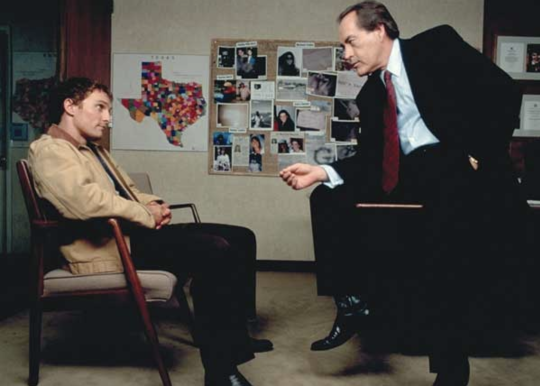
I know Frailty is a thriller. I can see Meiks raising an ax high to swing down and behead one of the humans he believes is a demon. I can see Meiks dragging his son Fenton (Matt O’Leary) into a freshly dug basement prison to hold him captive until he can hear God. And yet there is something oddly wholesome about Frailty in the same way there is something wholesome about The Night of the Hunter. Frailty is picking at the same basic scabs: the bewilderment of children forced to grow up fast and fight for their lives; the hysterics of fanatics gone too far; the isolation of belief. It is, despite its suggestions of violence, a story seen through a child’s eyes.
Paxton’s performance condenses the evil and the fatherly into a single character, which makes Meiks a totally believable enigma to the children and to audiences. Meiks is sure of himself and his mission, and he sees himself as an instrument of goodness. That knowing keeps him calm, not maniacal like a lunatic. In Night, we know that the Preacher is off his rocker, even if he truly does think he’s killing widows for God. In Frailty, there’s question from the beginning whether God really did visit upon Meiks, convincing him one night that he must kidnap and murder seven people from a list God has provided. Little Fenton doesn’t believe it. He’s the character with the strongest voice, the boy with an iron will.
One of the most successful aspects of Frailty is how it nails the peculiar ways children process information. When Meiks wakes up his two sons to tell them what his mission is, Fenton explains in voiceover that during breakfast the next morning, nothing else was spoken about dad’s impending murder spree, so Fenton was able to see his father’s late-night admissions as a bad dream, something that would pass and be ignored and never be spoken of again until maybe one day, years later, when it would pop into his head as a distant memory. This is a simple but phenomenal scene that exploits the inherent goodness in children and their overwhelming desire to make things normal and compensate for their parents’ shortcomings. When Paxton talked about that scene, he said, “the impotence of the children is where the horror is derived from.”
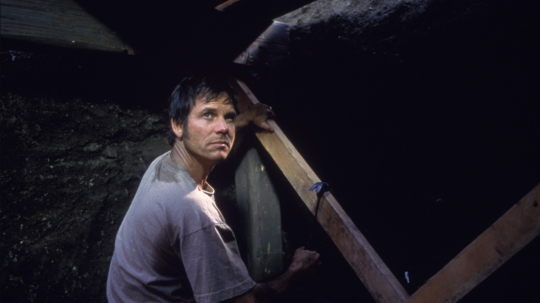
There are obvious things that can be said about Frailty’s commentary on religion. When the film was released, people couldn’t help asking Paxton what bearing it had on 9/11, what point he was trying to make. Admittedly, he wasn’t trying to make a point. The script was born in a world where men murdering for God seemed like something that happened elsewhere, to other people. But the longer he thought about it, the more Paxton understood that something in this film he made spoke to his own beliefs. He said, Frailty “belies the folly of man’s ego when he ordains himself to be ‘God’s destroyer.’ It’s such an egotistical idea–that whatever your beliefs are, whatever is up there needs man to carry out these devious and diabolical deeds. It’s not man’s job to do that.”
I’m frankly surprised there aren’t more movies like Frailty, ones that present a scarily realistic and sincere descent into fanaticism, especially seeing how fundamentalist Christianity and its partner, hypocrisy, has taken such a stronghold in American culture. Anyone who’s ever seriously studied or practiced Christianity knows all too well the tension between the literalists and the interpreters, those who believe it should be taken at face value that God could simply whisper in your ear one day to join his holy war, and those who see God’s voice as an abstract. Frailty is chilling, because it asks what we would do if the fundamentalists were right. The film doesn’t offer many easy answers for this, even though the ending is supposed to be a definitive narrative twist. In the same way that I saw The Night of the Hunter and felt that Laughton’s criticisms of religion were ultimately criticisms of man, not God, Frailty elicits those same emotions. They’re both lucid depictions of a struggle with faith.
Unlike Laughton, Paxton would get the chance to direct one more film, 2005’s The Greatest Game Ever Played, before he would pass at the age of 61 from a stroke. His obituaries popped up in the usual entertainment mags, but also in publications like Christian Daily, Catholic Online, and Christ and Pop Culture, who proclaimed that “Christian Actor Bill Paxton” had died. Paxton had plans for other movies, one a sequel to Frailty, but it was difficult for him to get people to take him seriously as a director. In 2002, he said, “I don’t think you get respect as an actor in this town. But you get respect as a filmmaker.” When Laughton died, he was just that actor who played Quasimodo and the patrician statesmen. Who knows how we’ll remember Paxton in the future?
